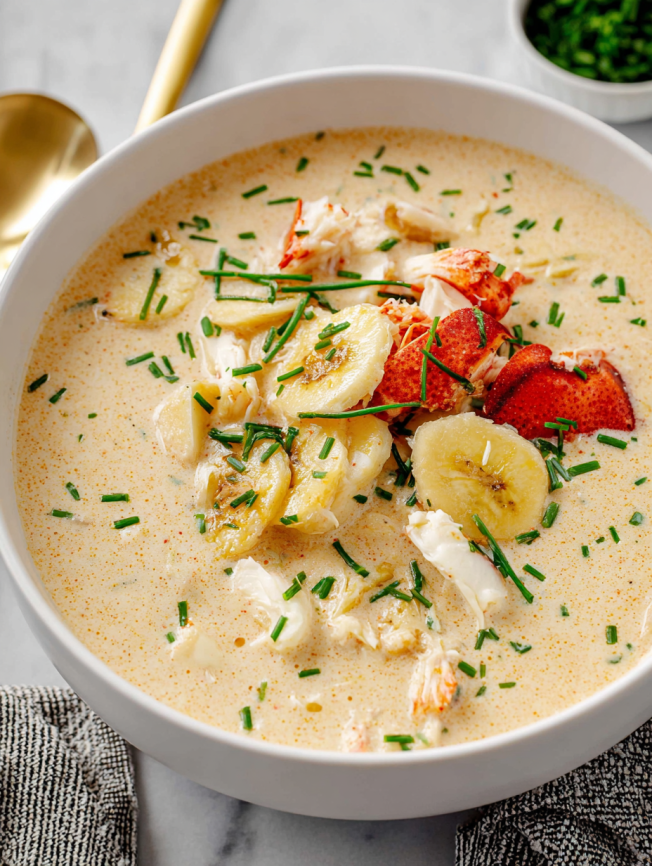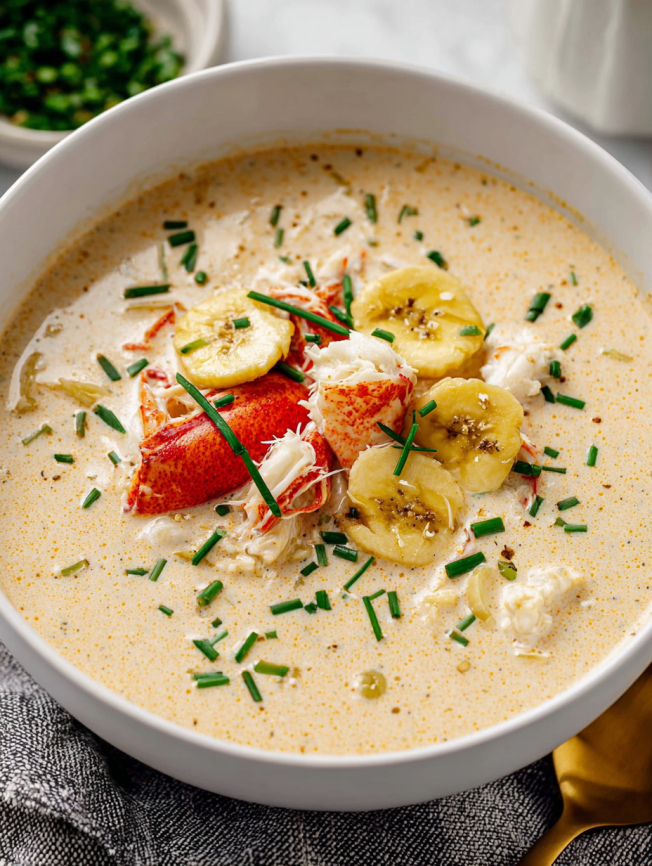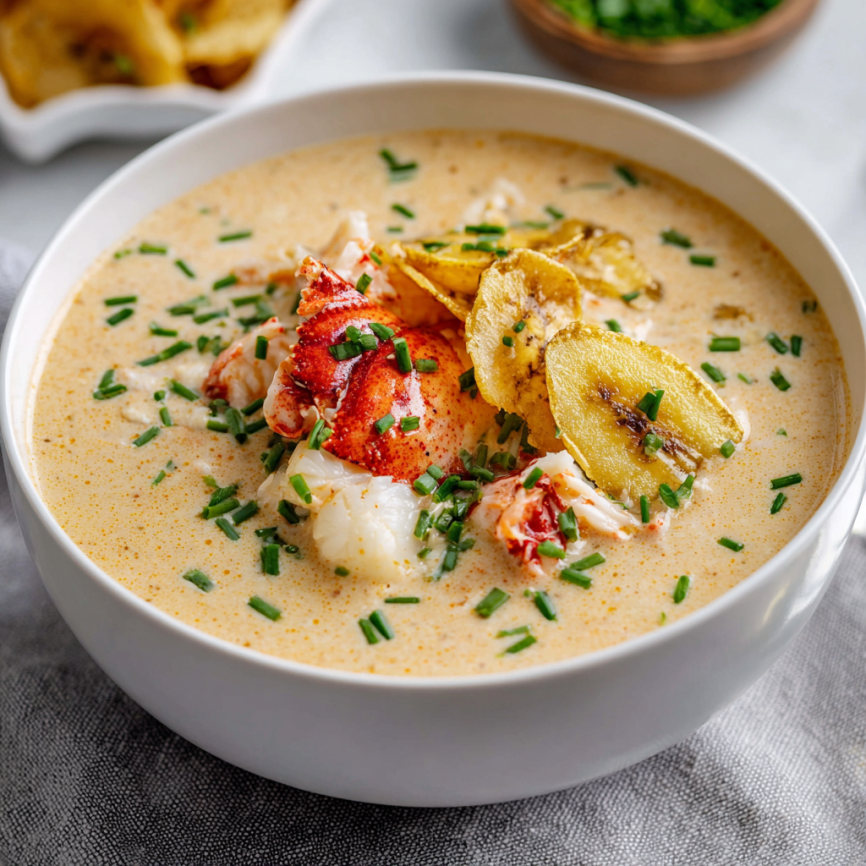When the first chill of autumn settles in, there’s nothing quite like a steaming bowl of homemade crab soup to warm both body and soul. I discovered this recipe during a particularly cold winter evening when I was craving something luxurious yet comforting. With a pound of fresh crab meat sitting in my refrigerator and a handful of pantry staples, I created what has become my family’s most requested cold-weather meal.
The beauty of this soup lies not just in its incredible flavor, but in its simplicity. Everything comes together in one pot, making cleanup a breeze while delivering restaurant-quality results. Each spoonful delivers tender chunks of sweet crab, perfectly cooked potatoes, and a velvety broth that coats your spoon like liquid gold.
Why This Recipe Will Become Your New Favorite
Lightning-Fast Preparation
First and foremost, this entire soup comes together in just 30 minutes from start to finish. With only 10 minutes of prep time, it’s perfect for busy weeknights when you want something special without spending hours in the kitchen. Moreover, the one-pot method means fewer dishes and more time to enjoy your meal with loved ones.
Restaurant-Quality Results at Home
Unlike many homemade soups that can taste flat or one-dimensional, this recipe builds layers of flavor through proper technique. The combination of seafood stock, chicken broth, and half-and-half creates a rich foundation that rivals the best restaurant versions. Additionally, the Old Bay seasoning adds that authentic seafood house flavor everyone craves.
Loaded with Premium Ingredients
Rather than skimping on the star ingredient, this recipe includes a generous half-pound of fresh crab meat. Each bowl is packed with substantial chunks that make every bite feel indulgent. Furthermore, the tender baby potatoes provide hearty substance while soaking up all those wonderful flavors.
Versatile and Customizable
This soup serves as an excellent base for creativity. Whether you prefer it as written or want to add extra vegetables for a chowder-style experience, the recipe adapts beautifully to your preferences and what you have on hand.
Essential Ingredients
Aromatic Base Components
- 6 tablespoons unsalted butter – Creates the rich roux foundation
- 1 yellow onion, diced – Provides sweet, savory depth
- 1 cup sliced celery – Adds classic soup texture and flavor
- 4 cloves garlic, minced – Enhances overall aromatic profile
- 6 tablespoons flour – Thickens the soup to perfect consistency
Liquid Foundation
- 1 quart (32 oz.) half and half – Creates luxurious creaminess
- 1 (14.5 oz.) can seafood stock – Intensifies oceanic flavors
- 1 cup chicken broth – Adds savory complexity
- 2 bay leaves – Provides subtle herbal undertones
Star Ingredients
- 1 lb. baby yellow potatoes, diced – Adds hearty substance
- 1/2 pound fresh crab meat – The premium centerpiece
- 1 tablespoon Old Bay seasoning – Classic seafood spice blend
- 2 teaspoons sherry vinegar – Brightens and balances flavors
- Kosher salt and fresh cracked pepper – Essential seasoning
Perfect Garnish Options
- Chopped fresh parsley – Adds color and freshness
- Sliced chives – Provides mild onion flavor
- Extra crab meat – Shows off the premium ingredient
- Oyster crackers – Classic soup accompaniment
- Additional Old Bay seasoning – For extra seafood flavor
Step-by-Step Instructions
Building the Flavor Base
Step 1: Begin by melting butter in a large Dutch oven over medium to medium-high heat. The Dutch oven’s heavy bottom ensures even heat distribution and prevents scorching.
Step 2: Add the diced onion and celery along with generous pinches of salt and pepper. Cook for 4 minutes, stirring occasionally, until the vegetables begin to soften and become fragrant.
Creating Aromatic Depth
Step 3: Reduce heat to medium, then add the minced garlic. Cook for 1 minute while stirring frequently to prevent burning. This step releases the garlic’s essential oils without creating bitterness.
Step 4: Sprinkle the flour over the vegetables and stir to combine thoroughly. Continue cooking for another minute, stirring occasionally. This step cooks out the raw flour taste while creating the thickening base.
Liquid Integration
Step 5: Pour in half of the seafood stock to deglaze the pan, scraping up all the flavorful browned bits from the bottom. These caramelized pieces add tremendous depth to the final soup.
Step 6: Gradually add the remaining seafood stock, half-and-half, and chicken broth, whisking constantly to prevent lumps from forming.
Adding Substance and Seasoning
Step 7: Stir in the diced potatoes, Old Bay seasoning, and bay leaves along with additional pinches of salt and pepper. Mix everything until well combined and evenly distributed.
Step 8: Increase heat to medium-high and bring the mixture to a gentle simmer. Watch carefully to prevent boiling, which could cause the dairy to curdle.
Final Cooking Phase
Step 9: Once simmering, reduce heat to medium-low and continue simmering gently for 5 minutes, stirring occasionally to prevent sticking.
Step 10: Add most of the crab meat to the pot, reserving the most attractive pieces for garnish. This ensures the crab heats through without overcooking.
Step 11: Continue simmering gently for another 5 minutes, or until the potatoes are fork-tender and the flavors have melded beautifully.
Finishing Touches
Step 12: Remove from heat and stir in the sherry vinegar, which brightens all the flavors. Taste and adjust seasoning with additional salt and pepper as needed.
Step 13: Ladle into warmed bowls and garnish with fresh chives, parsley, and reserved crab meat. Serve immediately with oyster crackers on the side.

Serving Suggestions
Elegant Dinner Party Presentation
For special occasions, serve this soup as a sophisticated first course in warmed bowls. Garnish each serving with a small mound of fresh crab meat and a delicate sprinkle of Old Bay seasoning. Additionally, provide small spoons and linen napkins for an upscale dining experience.
Cozy Family Dinner
During casual weeknight meals, serve generous portions as the main course alongside crusty bread and a simple green salad. The soup’s richness pairs beautifully with lighter, acidic accompaniments that cleanse the palate.
Cold Weather Comfort
On particularly chilly days, serve this soup in large mugs for a more casual, warming experience. This presentation works wonderfully for outdoor gatherings or when you want that ultimate comfort food feeling.
Creative Recipe Variations
Chowder-Style Addition
Transform this soup into a heartier chowder by adding 1 cup of corn kernels, diced carrots, or green beans along with the potatoes. These vegetables add color, texture, and nutritional value while creating a more substantial meal.
Smoky Bacon Enhancement
For added richness, cook 4-6 strips of bacon until crispy before starting the recipe. Remove the bacon, chop it, and use the rendered fat in place of some butter. Sprinkle the crispy bacon on top as garnish for extra flavor and texture.
Spicy Kick Version
Heat lovers can add a diced jalapeño with the onions and celery, or incorporate a few dashes of hot sauce to taste. The heat complements the sweet crab beautifully while adding complexity to each spoonful.
Extra Creamy Indulgence
For those who prefer an ultra-smooth texture, use an immersion blender to partially blend the soup before adding the crab. This creates a velvety consistency while still maintaining some texture from the vegetables and crab meat.
Make-Ahead Tips
Advanced Preparation Strategies
This soup can be made up to 2 days in advance, though there are important considerations. Prepare the soup completely but hold back the crab meat until reheating. Store the base in the refrigerator and add the crab during the gentle reheating process to prevent overcooking.
Proper Storage Methods
Cool the soup completely before refrigerating in airtight containers. The soup will keep for up to 3 days in the refrigerator. When reheating, do so gently over low heat, stirring frequently to prevent the dairy from separating.
Freezing Guidelines
While possible, freezing is not recommended due to the dairy content, which may separate and create an unpleasant texture upon thawing. If you must freeze, consider preparing and freezing the vegetable base without the dairy, then adding fresh half-and-half when reheating.
Professional Tips and Techniques
Seasoning Wisdom
The key to exceptional flavor lies in seasoning throughout the cooking process rather than just at the end. Add salt and pepper each time you introduce new ingredients – this technique builds layers of flavor that penetrate every component of the dish.
Preventing Dairy Separation
Maintain gentle heat throughout the cooking process to prevent the half-and-half from curdling. If the soup does separate, remove it from heat immediately and whisk vigorously, or use an immersion blender to re-emulsify.
Umami Enhancement
For deeper, more complex flavor, add a dash of Worcestershire sauce along with the sherry vinegar. This subtle addition enhances the overall umami profile without overwhelming the delicate crab flavor.
Texture Perfection
Cut potatoes uniformly to ensure even cooking. Pieces that are ½ to ¾ inch work perfectly – small enough to cook quickly but large enough to provide satisfying texture in each spoonful.
Essential Notes for Success
Ingredient Quality Matters
Since this recipe relies on simple, high-quality ingredients, don’t compromise on the crab meat. Fresh or high-quality canned crab makes an enormous difference in the final result. Similarly, using real seafood stock rather than substitutes elevates the entire dish.
Heat Control Is Critical
Maintaining proper temperature throughout cooking prevents common issues like curdled dairy or overcooked vegetables. Medium to medium-low heat works best for most of the cooking process, with brief periods of higher heat only when needed.
Customization Opportunities
This recipe serves as an excellent foundation for creativity. Feel free to incorporate seasonal vegetables, adjust spice levels, or modify the thickness to suit your preferences. The technique remains the same regardless of your additions.

Frequently Asked Questions
Can I use frozen crab meat instead of fresh?
Absolutely! Thaw frozen crab meat completely and drain any excess liquid before adding to the soup. While the texture may be slightly different from fresh, the flavor remains excellent. However, avoid adding frozen crab directly to the hot soup, as this can make the soup watery.
What if I can’t find seafood stock?
While seafood stock provides the best flavor, you can substitute with additional chicken broth or vegetable stock. For enhanced seafood flavor, consider adding a splash of clam juice or fish sauce to compensate for the missing oceanic notes.
How can I make this soup lighter?
For a lighter version, substitute the half-and-half with whole milk or a combination of milk and heavy cream. You can also reduce the butter slightly, though this will affect the richness. Another option is using Greek yogurt stirred in at the end for creaminess with fewer calories.
Why is my soup too thick or too thin?
Thickness can be adjusted easily during cooking. If too thick, gradually add more broth or half-and-half until desired consistency is reached. If too thin, create a slurry with equal parts flour and cold water, then whisk into the simmering soup until thickened.
Can I make this soup in a slow cooker?
While this recipe is designed for stovetop preparation, you can adapt it for slow cooking. Sauté the vegetables first, then transfer everything except the crab and sherry vinegar to the slow cooker. Cook on low for 4-6 hours, then add crab and vinegar during the last 15 minutes.
How do I reheat leftovers properly?
Reheat gently over low heat, stirring frequently to prevent separation. If the soup appears separated, whisk vigorously or use an immersion blender briefly. Add a splash of fresh half-and-half if needed to restore creaminess. Never boil when reheating, as this will cause the dairy to curdle.
What’s the best way to store fresh crab meat?
Fresh crab meat should be used within 1-2 days of purchase and kept refrigerated at all times. Store it in the coldest part of your refrigerator and check for any off odors before using. If you need to store it longer, freezing is possible for up to 3 months, though texture will change slightly.
Recipe Information:
- Prep Time: 10 minutes
- Cook Time: 20 minutes
- Total Time: 30 minutes
- Yield: 6 servings
- Category: Main Dish
- Method: Stove Top
- Cuisine: American
Nutrition per serving: 388 calories, 16.5g fat, 15.7g protein, 44g carbohydrates

